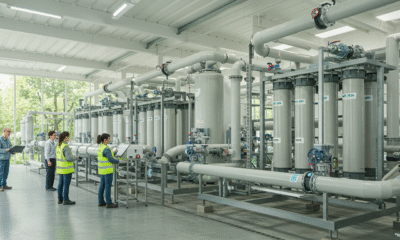

Environment
5 Key Benefits of Smart Buildings for Eco-Friendly Businesses
More entrepreneurs than ever are discovering the importance of adapting eco-friendly business models. Interest in sustainability increased sharply during the pandemic. In 2020, 45% of customers said that they sought out companies that focused on sustainability.
However, many companies have difficulty recognizing the steps that they can take to follow more sustainable practices. They have started working more closely with eco-friendly suppliers, creating paperless offices and in some cases, resorting to the use of renewable energy.
However, there is a highly overlooked opportunity to run a greener business. You can lower your carbon footprint with smart building technology.
Smart Buildings Are Crucial for Sustainability in Business
Smart buildings refer to buildings that rely on automated processes and technology to respond to their occupants’ needs. Over the last few years, smart buildings have made a huge impact across different sectors. They are attractive to all types of business, because they help improve their bottom lines. However, they are even more desirable for eco-friendly businesses, because they help the environment as well.
With more advancements in technology, this is expected to grow. Some of the benefits may not be clearly visible at the moment so it may be tough to pinpoint the benefits to both occupants and owners. Here are some of the benefits of smart buildings that eco-friendly entrepreneurs should know about.
1. Productivity And Efficiency Benefits
You obviously want to do your part to help the planet as an eco-friendly business. However, you won’t be able to have a positive impact on the planet if you can’t stay in business. Therefore, you have to consider the productivity benefits of smart buildings just as much as the environmental benefits.
One of the best features of smart building technology is the installation of environmental sensors that can be used to monitor various weather conditions such as humidity and temperature in every room, zone or the entire building at once. Temperature sensors have been in use for a very long time, especially when it comes to controlling air conditioning and heating.
However, the introduction of the Internet of Things has completely changed everything. Besides enhancing comfort for the occupants, sensors are also useful to machines, especially those that are temperature-sensitive to avoid overheating. Thanks to smart temperature sensors, heating can be automated. Even better, HVAC controls can be automated to maintain the best conditions and detect any issues once they happen.
Also, humidity sensor will be used to alert people in moisture-sensitive environments such as museums and hospitals if there is any moisture in the air. These devices will definitely improve productivity by ensuring that machinery and tools are operating in the best conditions. They also make sure that the temperature in the corporate environment is at a comfortable level. If they are too cold or too hot, productivity is likely going to start declining.
2. Environmental Benefits
Besides improving the operating and working environments for all occupants and the available machinery, smart building technology will have a huge positive impact on the whole environment. It reduces the overall use of energy and enhances efficiency. The growing use of smart buildings is one of the reasons that urban centers are becoming greener. For instance, motion sensors are designed to pick up on any physical movement.
Additionally, they can be used to automate building controls such as lighting and heating depending on whether or not the area is occupied. Activating lights when a corridor or room is in use can effectively reduce energy consumption. On the other hand, electrical current sensors are used to measure real-time energy consumption in any circuit, machine-level or zone. They identify how much energy is in use and which areas use more energy thereby avoiding waste.
They will also switch off devices automatically when not in use thereby reducing energy consumption. Small measures such as these will have a huge impact on overall energy use especially if you are planning to scale it across a whole estate or building.
3. Improve Space Utilization for Both Business and Environmental Benefits
Smart buildings are great for identifying the different ways to improve space utilization. This will help improve energy efficiency and real estate use. Therefore, it is good for both the environment and your bottom line.
One of the most overlooked advantages of smart building technology is the level of insight it can bring especially in the various uses of the building. It can also help identify if spaces are being paid especially if they are underutilized. Occupancy sensors are very valuable here since they can be used to highlight which desks or meeting spaces are available at any time. In large organizations or those with hot-desking or flexible working practices, this will result in the best employee experience.
It can also improve productivity and overall cost savings. It’s a great return on investment for businesses. Occupancy sensors are useful in various areas besides corporate workspaces. However, in a retail space, they can provide actionable data on customer footfall. The information can be used to determine the right product placement or where to move staff to the busy areas, especially checkout. It’s a great way to increase sales and overall customer experience.
4. Equipment Benefits
In the recent years, predictive maintenance has become very crucial for many businesses. It is possible, thanks to smart technology. Thanks to predictive maintenance, you no longer have to check manually how a piece of specific equipment is performing. Also, you don’t have to respond when something fails. Rather, there will be sensors in place to detect any changes in the performance of the building.
It will also trigger an action to resolve things before they become critical. In the long term, building management teams will get the most useful insights in overall building performance. They can use it more effectively to schedule maintenance and upgrades.
5. Financial Benefits
All the benefits mentioned above and many more will also lead to financial benefits. Besides increasing productivity, utilizing spaces more effectively and removing inefficiencies, creating a good experience for customers or better managing energy, these benefits will eventually create a good impact on your finances. However, if the smart technology is poorly implemented it will lead to a negative impact.
Occupants will not have the ability to control their environments. As such, there will be a lot of dissatisfaction in the building. Also, if the system isn’t properly planned, explained or implemented, it may lead to under-utilization. It may also be used incorrectly thereby having little or no impact on the environment.
Smart Buildings Are the Future of Eco-Friendly Businesses
Eco-friendly businesses are looking for new ways to improve their cost-effectiveness and lower their carbon footprint. There is ample evidence that smart buildings will help them reach these goals.


 Environment12 months ago
Environment12 months agoAre Polymer Banknotes: an Eco-Friendly Trend or a Groundswell?

 Features11 months ago
Features11 months agoEco-Friendly Cryptocurrencies: Sustainable Investment Choices

 Features12 months ago
Features12 months agoEco-Friendly Crypto Traders Must Find the Right Exchange

 Energy11 months ago
Energy11 months agoThe Growing Role of Solar Panels in Ireland’s Energy Future



























